Unit 5 Good manners 复习课件(36张PPT)
文档属性
| 名称 | Unit 5 Good manners 复习课件(36张PPT) | 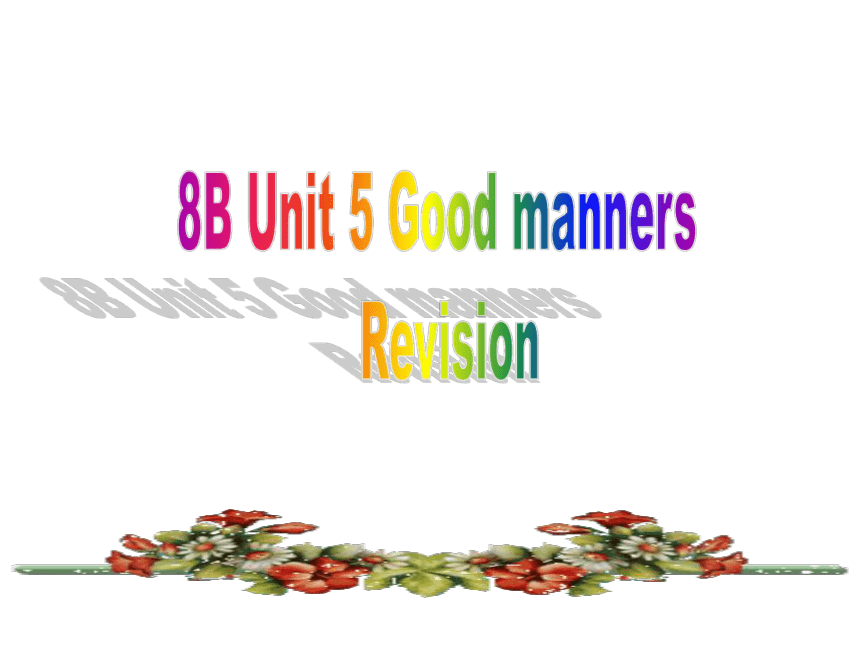 | |
| 格式 | pptx | ||
| 文件大小 | 1.2MB | ||
| 资源类型 | 教案 | ||
| 版本资源 | 牛津译林版 | ||
| 科目 | 英语 | ||
| 更新时间 | 2021-03-18 23:40:54 | ||
图片预览

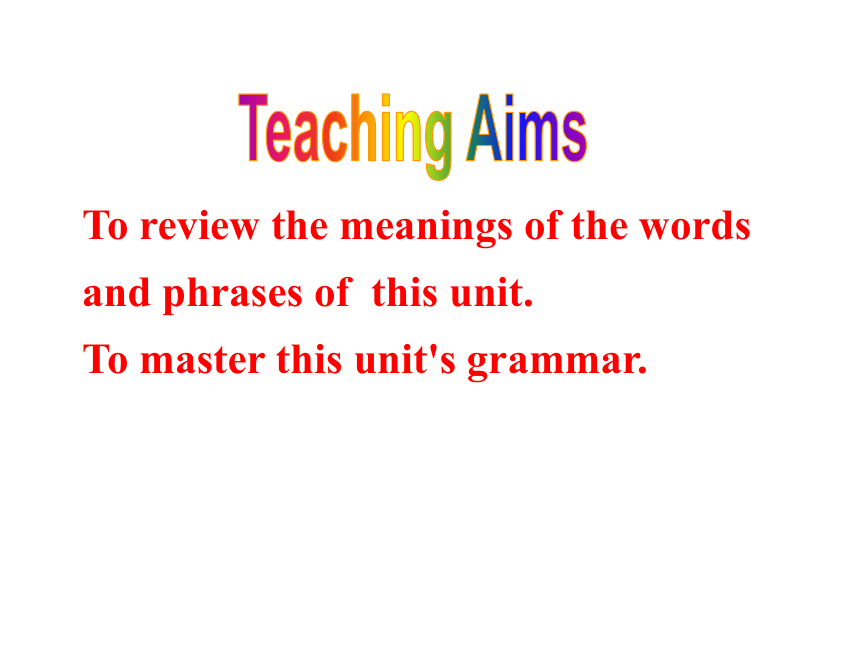
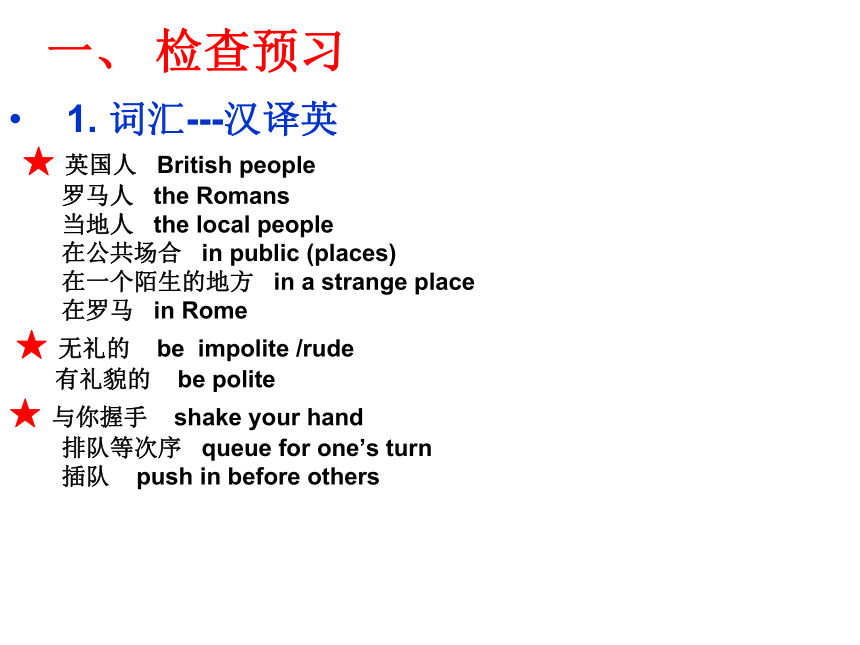
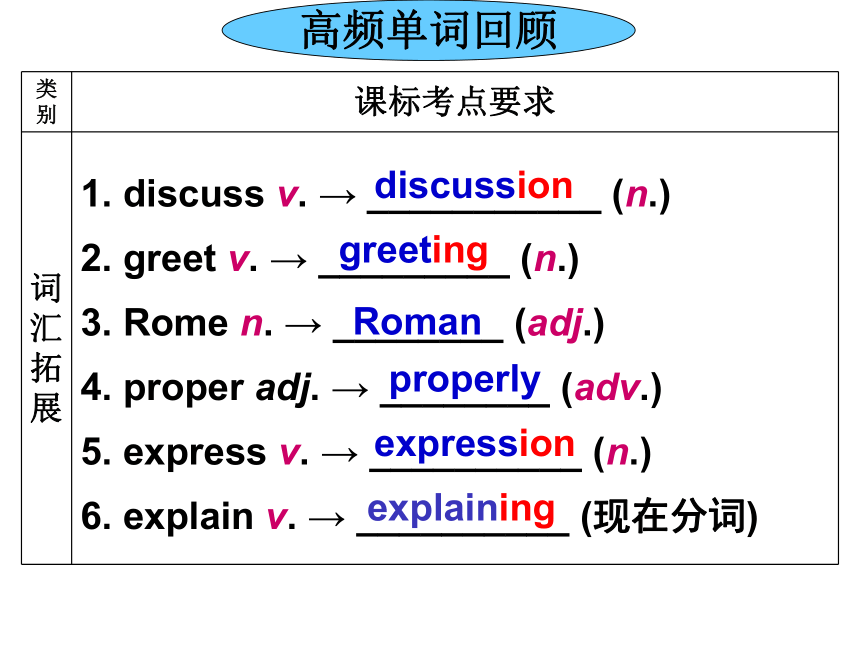
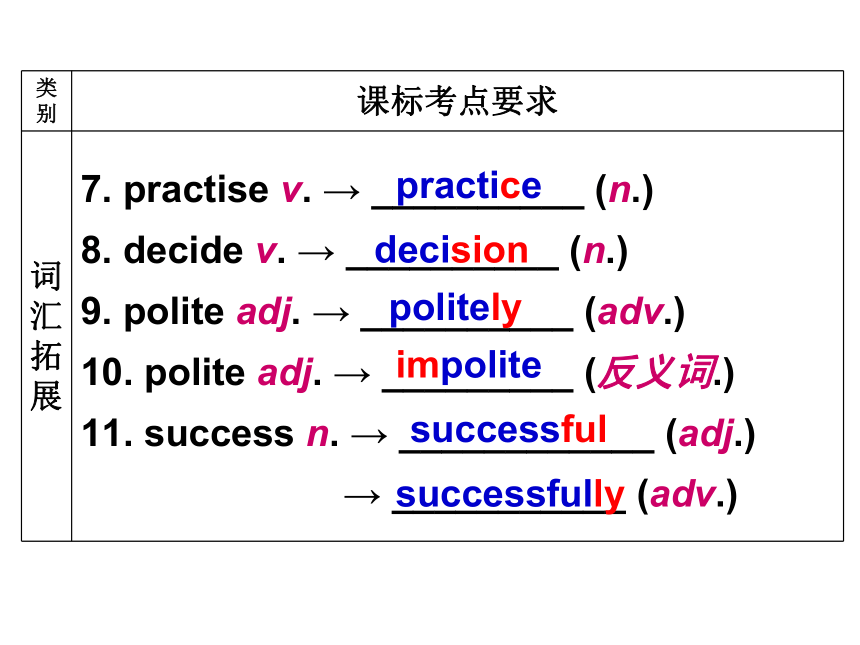
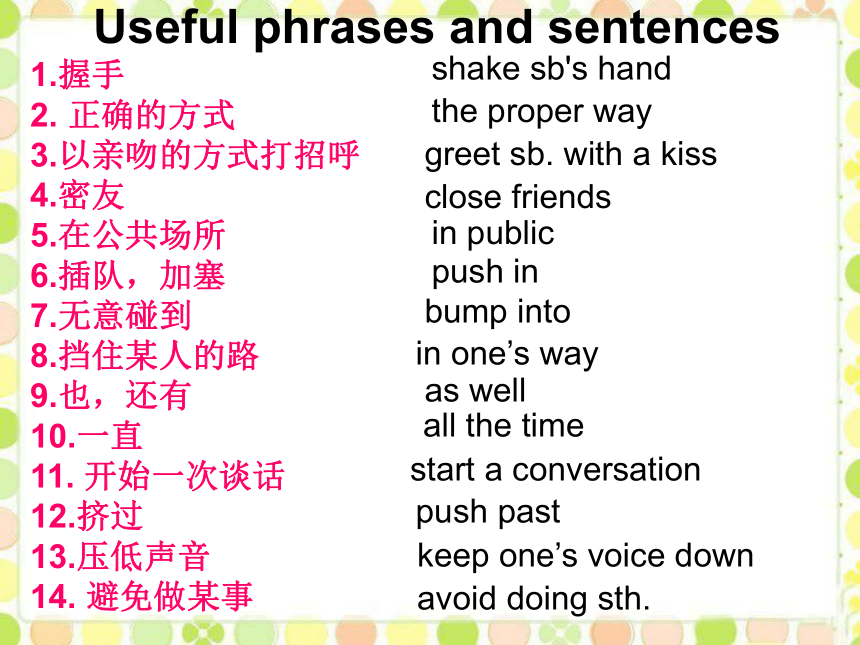
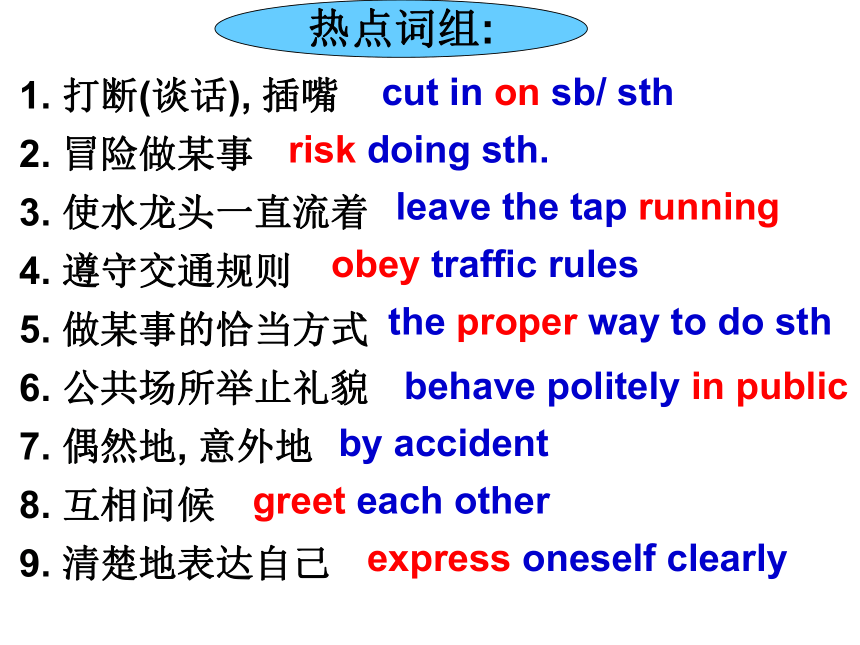
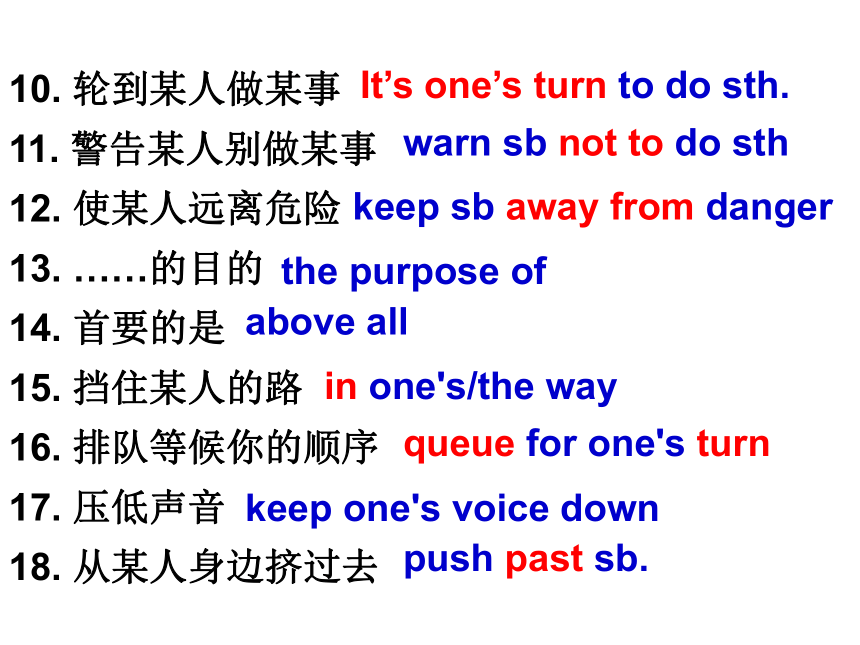
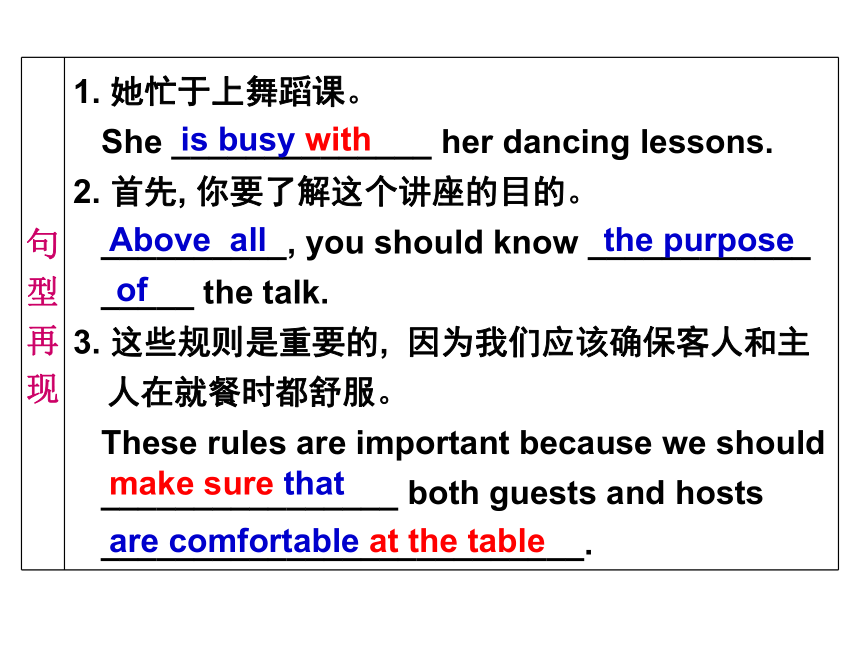
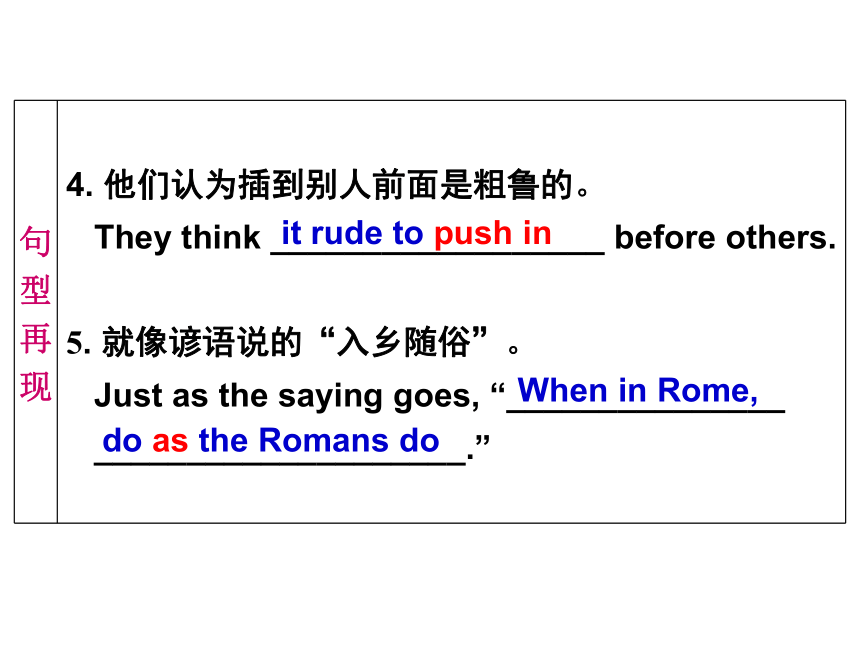
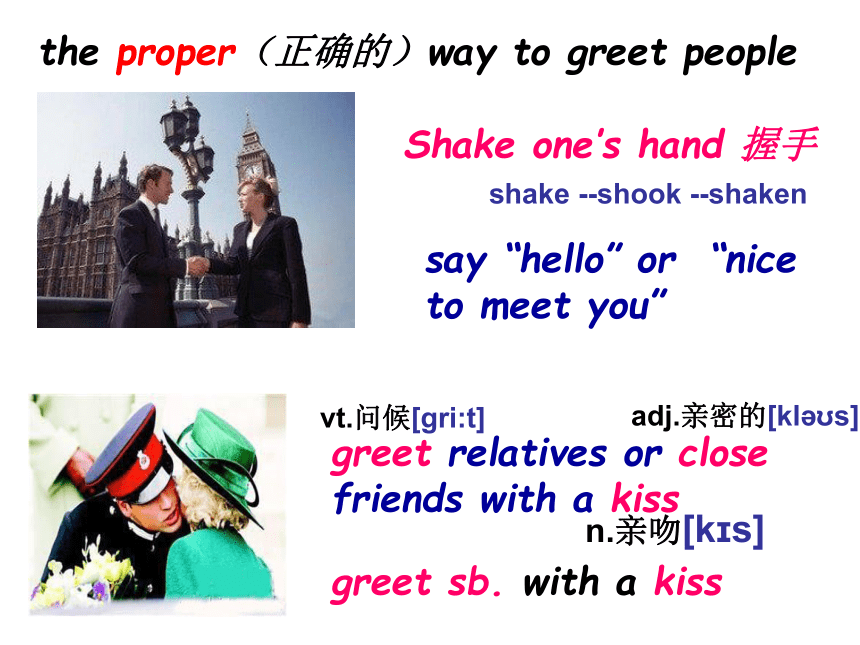
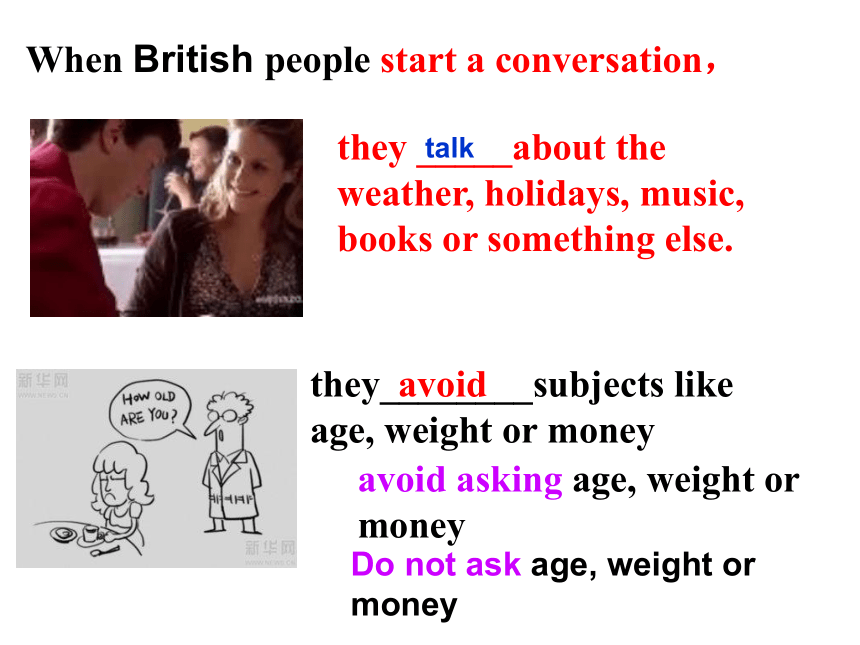
文档简介
8B Unit 5 Good manners
Revision
Teaching Aims
To review the meanings of the words and phrases of this unit.
To master this unit's grammar.
一、 检查预习
1. 词汇---汉译英
★ 英国人 British people
罗马人 the Romans
当地人 the local people
在公共场合 in public (places)
在一个陌生的地方 in a strange place
在罗马 in Rome
★ 无礼的 be impolite /rude
有礼貌的 be polite
★ 与你握手 shake your hand
排队等次序 queue for one’s turn
插队 push in before others
类别
课标考点要求
词汇
拓展
1. discuss v. → ___________ (n.)
2. greet v. → _________ (n.)
3. Rome n. → ________ (adj.)
4. proper adj. → ________ (adv.)
5. express v. → __________ (n.)
6. explain v. → __________ (现在分词)
高频单词回顾
discussion
greeting
Roman
properly
expression
explaining
类别
课标考点要求
词汇
拓展
7. practise v. → __________ (n.)
8. decide v. → __________ (n.)
9. polite adj. → __________ (adv.)
10. polite adj. → _________ (反义词.)
success n. → ____________ (adj.)
→ ___________ (adv.)
practice
decision
politely
successful
successfully
impolite
Useful phrases and sentences
shake sb's hand
1.握手
2. 正确的方式
3.以亲吻的方式打招呼
4.密友
5.在公共场所
6.插队,加塞
7.无意碰到
8.挡住某人的路
9.也,还有
10.一直
11. 开始一次谈话
12.挤过
13.压低声音
14. 避免做某事
the proper way
greet sb. with a kiss
close friends
in public
push in
bump into
in one’s way
as well
all the time
start a conversation
push past
keep one’s voice down
avoid doing sth.
1. 打断(谈话), 插嘴
2. 冒险做某事
3. 使水龙头一直流着
4. 遵守交通规则
5. 做某事的恰当方式
6. 公共场所举止礼貌
7. 偶然地, 意外地
8. 互相问候
9. 清楚地表达自己
热点词组:
cut in on sb/ sth
risk doing sth.
leave the tap running
obey traffic rules
the proper way to do sth
behave politely in public
by accident
greet each other
express oneself clearly
10. 轮到某人做某事
11. 警告某人别做某事
12. 使某人远离危险
13. ……的目的
14. 首要的是
15. 挡住某人的路
16. 排队等候你的顺序
17. 压低声音
18. 从某人身边挤过去
It’s one’s turn to do sth.
keep sb away from danger
the purpose of
above all
in one's/the way
queue for one's turn
push past sb.
warn sb not to do sth
keep one's voice down
句型
再现
1. 她忙于上舞蹈课。
She ______________ her dancing lessons.
2. 首先, 你要了解这个讲座的目的。
__________, you should know ____________
_____ the talk.
3. 这些规则是重要的, 因为我们应该确保客人和主
人在就餐时都舒服。
These rules are important because we should
________________ both guests and hosts
__________________________.
is busy with
make sure that
are comfortable at the table
Above all
the purpose
of
句型
再现
4. 他们认为插到别人前面是粗鲁的。
They think __________________ before others.
5. 就像谚语说的“入乡随俗”。
Just as the saying goes, “_______________
____________________.”
it rude to push in
When in Rome,
do as the Romans do
the proper(正确的)way to greet people
say “hello” or “nice to meet you”
Shake one’s hand 握手
greet relatives or close friends with a kiss
greet sb. with a kiss
shake --shook --shaken
vt.问候[ɡri:t]
adj.亲密的[kl??s]
n.亲吻[k?s]
When British people start a conversation,
they _____about the weather, holidays, music, books or something else.
avoid asking age, weight or money
they________subjects like age, weight or money
avoid
Do not ask age, weight or money
talk
When British people are in public,
they always ______ for their turn.
they never _________before others.
queue
push in
When British people are at home,
they are polite as well /too.
they say “please” or “thank you” all the time.
When British people are in public,
they don’t like to shout or laugh loudly
they keep their voice down.
in one’s way
挡住某人的路
push past
从…身边挤过去
Excuse me 劳驾
《中考指导》P96 课堂巩固(一)
British people usually say “hello” and “nice to meet you” and s_____ your hand when they meet you for the first time. They only greet relatives or close friends with a k____ . To start a c_______, they prefer subjects like the weather, holidays, music or books. They avoid talking about private topics like age, weight or money.
British people think that it is rude to p_____ in before others . They always queue for their t____. They say “sorry” if they bump into you in the street .When you happen to be in their way they won’t t______ you or push past you . Instead they will say “e______ me “and wait patiently till you move .They do not like to shout or laugh loudly in p_____ . British people are polite at home too .They say “please “ or “thank you” all the time .
hake
iss
onversation
ush
urn
ouch
xcuse
ublic
B. 用所给单词的适当形式填空。
6. In Italy, (kiss) is proper for greeting best friends and family members.
7. The more (polite) you ask people for help, the more willing they are to help you.
8. Always remember to make good use of time. As the (say) goes, “Time and tide wait for no man.”
9. Your advice is so (help) to us. Thanks.
10. When you’re eating in a restaurant, try
(not make) any noise.
kissing
politely
saying
helpful
not to make
Grammar
1. sb. + adj. + enough to do sth.
某人足够…做某事
2. sb. + be too +adj. + to do sth.
某人太…而不能做某事
_____ + be too +adj. + _______ to do.
sth.
for sb.
3. sb. + be so +adj. + that …
某人是如此…以致于…
The apple is very high. The child can’t reach it.
=The apple is too high for the child to reach.
当句子主语与不定式主语不一致时, 可以在不
定式前加 for sb. 引出逻辑主语.
too...to的用法
三个结构的转换
so …that… too…to
The boy is clever enough to work out the problem.
His borther is so young that he can’t go to school.
His borther is too young to go to school.
so …that… …enough to
The box is so heavy that he can’t carry.
The box is too heavy for him to carry.
The boy is so clever that he can work out the problem.
三个结构的转换
too …to… …enough to
His borther is too young to go to school.
His borther is not old enough to go to school.
1.加not
2.形容词变反义词
这个盒子太重,我搬不动。
The box was too heavy for me to carry.
=The box was not light enough for me to carry.
=The box was so heavy that I can’t carry it.
.The purpose is to teach students manners for eating.
填空:
(1). The aim of the article is ___ ____ (help ) the students learn about manners .
(2). His job is _____ _____ ( introduce ) each star .
(3). 这个游戏的目的是教我们地理知识。
The ___________ of the game is
_______ ______ us knowledge about geography .
to help
to introduce
purpose /aim
to teach
. You should not start eating until everyone is ready .
should do sth. should not do sth.
(1)在公共场合我们应该排队等候。我们不应该插队。
In public places , we _________________.
We ________________________.
(2) 我们应该像当地人一样做。
We ____________ as the local people do .
should queue for our turn
should not push in before others .
should do
We should not …
pick flowers in the park
leave the tap running
drop litter everywhere
keep quiet in the library
obey traffic rules
queue for our turn
We should …(动词原形)
四、复习巩固
1.第一次见面,英国人通常会说“你好”或者“很高兴认识你”,与你握手。
British people usually _____________________________
_____________________________
________________.
say “hello” and “nice to meet you”
and shake your hand
when they meet you for the first time.
2.在公共场合,他们举止得体,他们认为插队是不礼貌的行为,
他们总是排队;在家里他们也非常有礼貌。
They behave politely _________.
They think__________________.
They always_______.
They________________________too / as
well.
in public
it’s rude to push in before others
queue
are very polite at home
3.“入乡随俗”.当我们在一个陌生的地方,我们我们应该像当地人一样做。
“_____________________________________”
When we are in a strange place, we should __________________________.
When in Rome, do as the Romans do.
do as the local people do
Who has the best memory?
shake sb's hand
1.握手
2. 正确的方式
3.以亲吻的方式打招呼
4.密友
5.在公共场所
6.插队,加塞
7.无意碰到
8.挡住某人的路
9.也,还有
10.一直
11. 开始一次谈话
12.挤过
13.压低声音
14. 避免做某事
the proper way
greet sb. with a kiss
close friends
in public
push in
bump into
in one’s way
as well
all the time
start a conversation
push past
keep one’s voice down
avoid doing sth.
Ⅰ. 翻译下列句子。
1. 他够上学年龄了。
2. 她真慷慨,为我们买了这多礼物。
3. 这个盒子太重,小男孩搬不动。
4. 昨天他太兴奋了,都不能清楚表达自己了。
Exercises
He is old enough to go to school.
She is generous enough to buy us so many presents.
The box is too heavy for the little boy to carry.
He was too excited to express himself clearly.
5. 这男孩年龄太小,不能照顾自己。
6. 他们太慢了,赶不上这辆公交车了。
This boy is too young to look after himself.
They are too slow to catch the bus.
Homework
1. 朗读《口语》P35页第12篇。
2. 背诵《口语》P65—66 第20篇话题简述。
3. 完成《中考指南》P96--97
1. A cold hand and a warm heart.
2. Birds of a feather flock together.
3. Love me, Love my dog.
刀子嘴,豆腐心。
物以类聚,人以群分。
爱屋及乌。
Guessing time
4. It is better to trust the eye than the
ear.
5. It is never too late to mend.
百闻不如一见。
亡羊补牢,犹未晚矣。
Revision
Teaching Aims
To review the meanings of the words and phrases of this unit.
To master this unit's grammar.
一、 检查预习
1. 词汇---汉译英
★ 英国人 British people
罗马人 the Romans
当地人 the local people
在公共场合 in public (places)
在一个陌生的地方 in a strange place
在罗马 in Rome
★ 无礼的 be impolite /rude
有礼貌的 be polite
★ 与你握手 shake your hand
排队等次序 queue for one’s turn
插队 push in before others
类别
课标考点要求
词汇
拓展
1. discuss v. → ___________ (n.)
2. greet v. → _________ (n.)
3. Rome n. → ________ (adj.)
4. proper adj. → ________ (adv.)
5. express v. → __________ (n.)
6. explain v. → __________ (现在分词)
高频单词回顾
discussion
greeting
Roman
properly
expression
explaining
类别
课标考点要求
词汇
拓展
7. practise v. → __________ (n.)
8. decide v. → __________ (n.)
9. polite adj. → __________ (adv.)
10. polite adj. → _________ (反义词.)
success n. → ____________ (adj.)
→ ___________ (adv.)
practice
decision
politely
successful
successfully
impolite
Useful phrases and sentences
shake sb's hand
1.握手
2. 正确的方式
3.以亲吻的方式打招呼
4.密友
5.在公共场所
6.插队,加塞
7.无意碰到
8.挡住某人的路
9.也,还有
10.一直
11. 开始一次谈话
12.挤过
13.压低声音
14. 避免做某事
the proper way
greet sb. with a kiss
close friends
in public
push in
bump into
in one’s way
as well
all the time
start a conversation
push past
keep one’s voice down
avoid doing sth.
1. 打断(谈话), 插嘴
2. 冒险做某事
3. 使水龙头一直流着
4. 遵守交通规则
5. 做某事的恰当方式
6. 公共场所举止礼貌
7. 偶然地, 意外地
8. 互相问候
9. 清楚地表达自己
热点词组:
cut in on sb/ sth
risk doing sth.
leave the tap running
obey traffic rules
the proper way to do sth
behave politely in public
by accident
greet each other
express oneself clearly
10. 轮到某人做某事
11. 警告某人别做某事
12. 使某人远离危险
13. ……的目的
14. 首要的是
15. 挡住某人的路
16. 排队等候你的顺序
17. 压低声音
18. 从某人身边挤过去
It’s one’s turn to do sth.
keep sb away from danger
the purpose of
above all
in one's/the way
queue for one's turn
push past sb.
warn sb not to do sth
keep one's voice down
句型
再现
1. 她忙于上舞蹈课。
She ______________ her dancing lessons.
2. 首先, 你要了解这个讲座的目的。
__________, you should know ____________
_____ the talk.
3. 这些规则是重要的, 因为我们应该确保客人和主
人在就餐时都舒服。
These rules are important because we should
________________ both guests and hosts
__________________________.
is busy with
make sure that
are comfortable at the table
Above all
the purpose
of
句型
再现
4. 他们认为插到别人前面是粗鲁的。
They think __________________ before others.
5. 就像谚语说的“入乡随俗”。
Just as the saying goes, “_______________
____________________.”
it rude to push in
When in Rome,
do as the Romans do
the proper(正确的)way to greet people
say “hello” or “nice to meet you”
Shake one’s hand 握手
greet relatives or close friends with a kiss
greet sb. with a kiss
shake --shook --shaken
vt.问候[ɡri:t]
adj.亲密的[kl??s]
n.亲吻[k?s]
When British people start a conversation,
they _____about the weather, holidays, music, books or something else.
avoid asking age, weight or money
they________subjects like age, weight or money
avoid
Do not ask age, weight or money
talk
When British people are in public,
they always ______ for their turn.
they never _________before others.
queue
push in
When British people are at home,
they are polite as well /too.
they say “please” or “thank you” all the time.
When British people are in public,
they don’t like to shout or laugh loudly
they keep their voice down.
in one’s way
挡住某人的路
push past
从…身边挤过去
Excuse me 劳驾
《中考指导》P96 课堂巩固(一)
British people usually say “hello” and “nice to meet you” and s_____ your hand when they meet you for the first time. They only greet relatives or close friends with a k____ . To start a c_______, they prefer subjects like the weather, holidays, music or books. They avoid talking about private topics like age, weight or money.
British people think that it is rude to p_____ in before others . They always queue for their t____. They say “sorry” if they bump into you in the street .When you happen to be in their way they won’t t______ you or push past you . Instead they will say “e______ me “and wait patiently till you move .They do not like to shout or laugh loudly in p_____ . British people are polite at home too .They say “please “ or “thank you” all the time .
hake
iss
onversation
ush
urn
ouch
xcuse
ublic
B. 用所给单词的适当形式填空。
6. In Italy, (kiss) is proper for greeting best friends and family members.
7. The more (polite) you ask people for help, the more willing they are to help you.
8. Always remember to make good use of time. As the (say) goes, “Time and tide wait for no man.”
9. Your advice is so (help) to us. Thanks.
10. When you’re eating in a restaurant, try
(not make) any noise.
kissing
politely
saying
helpful
not to make
Grammar
1. sb. + adj. + enough to do sth.
某人足够…做某事
2. sb. + be too +adj. + to do sth.
某人太…而不能做某事
_____ + be too +adj. + _______ to do.
sth.
for sb.
3. sb. + be so +adj. + that …
某人是如此…以致于…
The apple is very high. The child can’t reach it.
=The apple is too high for the child to reach.
当句子主语与不定式主语不一致时, 可以在不
定式前加 for sb. 引出逻辑主语.
too...to的用法
三个结构的转换
so …that… too…to
The boy is clever enough to work out the problem.
His borther is so young that he can’t go to school.
His borther is too young to go to school.
so …that… …enough to
The box is so heavy that he can’t carry.
The box is too heavy for him to carry.
The boy is so clever that he can work out the problem.
三个结构的转换
too …to… …enough to
His borther is too young to go to school.
His borther is not old enough to go to school.
1.加not
2.形容词变反义词
这个盒子太重,我搬不动。
The box was too heavy for me to carry.
=The box was not light enough for me to carry.
=The box was so heavy that I can’t carry it.
.The purpose is to teach students manners for eating.
填空:
(1). The aim of the article is ___ ____ (help ) the students learn about manners .
(2). His job is _____ _____ ( introduce ) each star .
(3). 这个游戏的目的是教我们地理知识。
The ___________ of the game is
_______ ______ us knowledge about geography .
to help
to introduce
purpose /aim
to teach
. You should not start eating until everyone is ready .
should do sth. should not do sth.
(1)在公共场合我们应该排队等候。我们不应该插队。
In public places , we _________________.
We ________________________.
(2) 我们应该像当地人一样做。
We ____________ as the local people do .
should queue for our turn
should not push in before others .
should do
We should not …
pick flowers in the park
leave the tap running
drop litter everywhere
keep quiet in the library
obey traffic rules
queue for our turn
We should …(动词原形)
四、复习巩固
1.第一次见面,英国人通常会说“你好”或者“很高兴认识你”,与你握手。
British people usually _____________________________
_____________________________
________________.
say “hello” and “nice to meet you”
and shake your hand
when they meet you for the first time.
2.在公共场合,他们举止得体,他们认为插队是不礼貌的行为,
他们总是排队;在家里他们也非常有礼貌。
They behave politely _________.
They think__________________.
They always_______.
They________________________too / as
well.
in public
it’s rude to push in before others
queue
are very polite at home
3.“入乡随俗”.当我们在一个陌生的地方,我们我们应该像当地人一样做。
“_____________________________________”
When we are in a strange place, we should __________________________.
When in Rome, do as the Romans do.
do as the local people do
Who has the best memory?
shake sb's hand
1.握手
2. 正确的方式
3.以亲吻的方式打招呼
4.密友
5.在公共场所
6.插队,加塞
7.无意碰到
8.挡住某人的路
9.也,还有
10.一直
11. 开始一次谈话
12.挤过
13.压低声音
14. 避免做某事
the proper way
greet sb. with a kiss
close friends
in public
push in
bump into
in one’s way
as well
all the time
start a conversation
push past
keep one’s voice down
avoid doing sth.
Ⅰ. 翻译下列句子。
1. 他够上学年龄了。
2. 她真慷慨,为我们买了这多礼物。
3. 这个盒子太重,小男孩搬不动。
4. 昨天他太兴奋了,都不能清楚表达自己了。
Exercises
He is old enough to go to school.
She is generous enough to buy us so many presents.
The box is too heavy for the little boy to carry.
He was too excited to express himself clearly.
5. 这男孩年龄太小,不能照顾自己。
6. 他们太慢了,赶不上这辆公交车了。
This boy is too young to look after himself.
They are too slow to catch the bus.
Homework
1. 朗读《口语》P35页第12篇。
2. 背诵《口语》P65—66 第20篇话题简述。
3. 完成《中考指南》P96--97
1. A cold hand and a warm heart.
2. Birds of a feather flock together.
3. Love me, Love my dog.
刀子嘴,豆腐心。
物以类聚,人以群分。
爱屋及乌。
Guessing time
4. It is better to trust the eye than the
ear.
5. It is never too late to mend.
百闻不如一见。
亡羊补牢,犹未晚矣。
